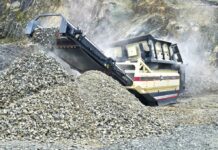The newly-developed Wirtgen AutoPilot 2.0 can produce all manner of offset and inset profiles even more economically and precisely than ever before. The 3D system either uses an existing data model or it creates a new, digital data model at the site. Wirtgen supplies the AutoPilot 2.0 for the models SP 15/SP 15i and SP 25/SP 25i. It can also be retrofitted to the machines.
No need for a stringline or creating a geodetic data model
The AutoPilot 2.0 can be used, for example, for making concrete safety barriers, curbs, traffic islands or for road surfaces with a width of up to 3.5 m. The 3D control system comprises a computer integrated into the machine and a tablet attached to the Field Rover survey pole. Two GPS receivers mounted on the machine communicate with a GPS reference station at the job site. The satellite-based navigation system (GNSS) controls the steering and cross slope of the slipform paver fully automatically. All that is needed is the reception of a sufficient number of satellites and an operator trained to handle the system. The advantage: Surveying, setup and dismantling of string lines is no longer necessary and the lines no longer get in the way of the teams working around the paver. The concrete mixers have more space for maneuvering, which makes material transport to the slipform paver much easier. As a result the overall process is much faster and more economical. It is no longer necessary to create a geodetic data model in advance.

Two options: How it works
Users can create a virtual string line themselves on the job site with the intuitive software on the robust tablet – and they have two different methods to choose from.
With option 1, the user imports the data of an existing 3D model onto the tablet.
With option 2, he plots the stretch to be paved with the Wirtgen Field Rover survey pole and defines individual measuring points. The highlight is that the software computes the optimum course on the basis of the measuring points, creating a virtual string line. Existing objects such as water inlets, hydrants or lampposts can be taken into account and the virtual string line modified as required.
Automatic quality testing
The software also features tools that can be used in a similar way as setting up a conventional string line. To achieve the best paving quality, the software automatically tests the imported or newly created data for kinks affecting steering and height control and displays these on the tablet. The user can then correct unwanted kinks in the model data by rounding them with a few simple steps on the touch screen using graphic editors.On the Wirtgen AutoPilot 2.0, the map view on the tablet shows the entire job site with all objects. Each object can be checked directly with the Field Rover. It therefore is possible to take existing water inlets, hydrants etc. into account.

After quality testing, the tablet is connected to the machine control of the slipform paver and the created specifications communicated to the machine. The concrete paver then starts on its own at the specified starting point and progresses automatically along the pre-defined course.
Clear display for simple operation
Thanks to the process-oriented structure of the graphics, users are able to create, check and pave even complex objects in a very short time using the tablet. It is also guaranteed that existing objects on the job site are included in the data. Users retain full control and can intervene in the autonomous paving process at any time. What is more, this clever tool is also very easy to use.
![[Video] New Generation DAF Trucks in ‘Construction Simulator’ Game](https://www.heavyquipusa.com/wp-content/uploads/2025/02/DAF-trucks-218x150.jpg)









![[Video] Mammoet’s World’s Most Powerful Land-Based Crane Passes All-Electric Operation Test](https://www.heavyquipusa.com/wp-content/uploads/2025/01/Mammoet-218x150.jpg)

 Copyright 2020 All rights reserved.
Copyright 2020 All rights reserved.